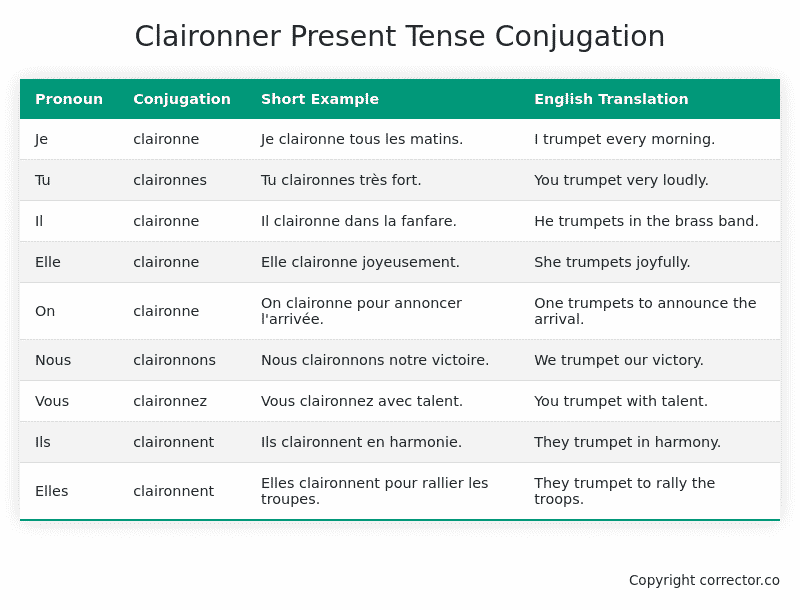Le Present (Present Tense) Conjugation of the French Verb claironner
Introduction to the verb claironner
The English translation of the French verb “claironner” is “to trumpet” or “to blare”. The infinitive form, “claironner”, is pronounced as /klɛ.ʁɔ.ne/.
The word “claironner” comes from the noun “clairon”, which means “bugle” or “trumpet” in French. It is most often used in everyday French to describe a loud and powerful sound, similar to the sound produced by a bugle or trumpet. It can also be used figuratively to describe someone speaking loudly or confidently.
Examples of usage:
- Les trompettes claironnaient à l’entrée du roi. (The trumpets blared at the king’s entrance.)
- Elle claironne toujours ses opinions sans se soucier des autres. (She always trumpets her opinions without caring about others.)
- Les haut-parleurs du stade claironnaient les annonces pendant tout le match. (The stadium speakers blared the announcements throughout the entire match.)
Please note that the translations provided are approximate and may vary depending on the context.
Claironner – About the French Present Tense
To take a deep dive into all the French tenses then see our article on Mastering French Tense Conjugation.
Common Everyday Usage Patterns For Le Present
Interactions with Other Tenses
Table of the Present Tense Conjugation of claironner
| Pronoun | Conjugation | Short Example | English Translation |
|---|---|---|---|
| Je | claironne | Je claironne tous les matins. | I trumpet every morning. |
| Tu | claironnes | Tu claironnes très fort. | You trumpet very loudly. |
| Il | claironne | Il claironne dans la fanfare. | He trumpets in the brass band. |
| Elle | claironne | Elle claironne joyeusement. | She trumpets joyfully. |
| On | claironne | On claironne pour annoncer l’arrivée. | One trumpets to announce the arrival. |
| Nous | claironnons | Nous claironnons notre victoire. | We trumpet our victory. |
| Vous | claironnez | Vous claironnez avec talent. | You trumpet with talent. |
| Ils | claironnent | Ils claironnent en harmonie. | They trumpet in harmony. |
| Elles | claironnent | Elles claironnent pour rallier les troupes. | They trumpet to rally the troops. |
Other Conjugations for Claironner.
Le Present (Present Tense) Conjugation of the French Verb claironner (You’re reading it right now!)
Imparfait (Imperfect) Tense Conjugation of the French Verb claironner
Passé Simple (Simple Past) Tense Conjugation of the French Verb claironner
Passé Composé (Present Perfect) Tense Conjugation of the French Verb claironner
Futur Simple (Simple Future) Tense Conjugation of the French Verb claironner
Futur Proche (Near Future) Tense Conjugation of the French Verb claironner
Plus-que-parfait (Pluperfect) Tense Conjugation of the French Verb claironner
Passé Antérieur (Past Anterior) Tense Conjugation of the French Verb claironner
Futur Antérieur (Future Anterior) Tense Conjugation of the French Verb claironner
Subjonctif Présent (Subjunctive Present) Tense Conjugation of the French Verb claironner
Subjonctif Passé (Subjunctive Past) Tense Conjugation of the French Verb claironner
Subjonctif Imparfait (Subjunctive Imperfect) Tense Conjugation of the French Verb claironner
Subjonctif Plus-que-parfait (Subjunctive Pluperfect) Tense Conjugation of the French Verb claironner
Conditionnel Présent (Conditional Present) Tense Conjugation of the French Verb claironner
Conditionnel Passé (Conditional Past) Tense Conjugation of the French Verb claironner
Conditionnel Passé II (Conditional Past II) Tense Conjugation of the French Verb claironner
L’impératif Présent (Imperative Present) Tense Conjugation of the French Verb claironner
L’impératif Passé (Imperative Past) Tense Conjugation of the French Verb claironner
L’infinitif Présent (Infinitive Present) Tense Conjugation of the French Verb claironner
L’infinitif Passé (Infinitive Past) Tense Conjugation of the French Verb claironner
Le Participe Présent (Present Participle) Tense Conjugation of the French Verb claironner
Le Participe Passé (Past Participle) Tense Conjugation of the French Verb claironner
Struggling with French verbs or the language in general? Why not use our free French Grammar Checker – no registration required!
Get a FREE Download Study Sheet of this Conjugation 🔥
Simply right click the image below, click “save image” and get your free reference for the claironner present tense conjugation!

I hope you enjoyed this article on the verb claironner. Still in a learning mood? Check out another TOTALLY random French verb present conjugation!


